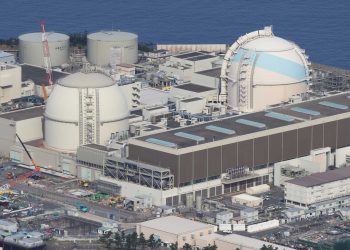Agence France-Presse,
North Korea has agreed to declare all its nuclear programmes and disable its main atomic reactor by the end of the year under US supervision, according to a six-nation agreement released Wednesday.
The deal — the second phase of a long-running process aimed at ending the North's atomic weapons drive — was immediately welcomed by US President George W. Bush, as well as other six-party participants Japan and South Korea.
UN Secretary General Ban Ki-moon, who is South Korean, also welcomed the move and appealed to all the parties concerned “to step up their work for denuclearisation”.
North Korea “agreed to disable all its existing nuclear facilities” as the next step in a landmark agreement reached by the six parties in February, according to a copy of the text released by China, the host of the talks.
As part of the second phase, North Korea will disable its five-megawatt plutonium producing reactor and two other key facilities at Yongbyon by December 31.
Those facilities were described by Bush as the “core” of North Korea's nuclear weapons programme, according to a US government statement released in Washington.
The Yongbyon facilities, as well as two other minor sites, were shut down in July as part of the first phase of the February accord.
“At the request of the other parties, the United States will lead disablement activities,” Wednesday's statement said, adding that US experts would lead a team to the North within two weeks to begin preparations.
North Korea also agreed to provide a “complete and correct declaration of all its nuclear programmes” by December 31.
The reclusive North has spent decades developing its nuclear programmes and no one outside the country knows for sure how much atomic material it has produced, or whether there are any other facilities it has yet to declare.
While Yongbyon produced plutonium, the United States had previously accused the North of also running a secret programme to develop highly enriched uranium.
Both highly enriched uranium and plutonium can be used to make nuclear weapons. However there was no mention of uranium in Wednesday's statement.
In return for pushing ahead with disarmament, the five other parties to the talks will provide North Korea with another 900,000 tonnes of heavy fuel oil or its equivalent in aid, the pact said.
The impoverished nation has already received 100,000 tonnes from South Korea and China after it shut down Yongbyon and allowed inspectors from the UN's atomic watchdog back into the country.
Bush last week gave the go-ahead to deliver another tranche of 50,000 tonnes.
Wednesday's statement said the United States agreed to work to improve bilateral relations with North Korea, “moving towards a full diplomatic relationship.”
Washington also committed to work towards removing the North from its list of state sponsors of terrorism, but only if Pyongyang continued pushing ahead with disarmament, the agreement said.
Pyongyang was tasked with improving its troubled relations with Japan and resolving issues left over from an “unfortunate past” — an apparent reference to Japan's wartime occupation of the Korean peninsula and the kidnapping of Japanese nationals by Pyongyang.
The agreement came after the chief envoys from the six nations held four days of talks in Beijing that ended on Sunday. Russia is the final member of the forum.
They said then that the deal had been brokered but the statement was not released until the governments of all six nations had approved it.
Wednesday's statement also came as North and South Korea held their first leaders' summit in seven years. The talks between the North's Kim Jong-Il and the South's Roh Moo-Hyun in Pyongyang achieved “good results,” officials said.
The six-party disarmament talks, which began in 2003, failed to stop North Korea from conducting its first test of an atomic bomb in October last year.
However negotiations continued and finally resulted in the February accord that has become the blueprint for disarmament.
The third and final disarmament phase to be implemented in early 2008 would require North Korea to surrender all its fissile material and nuclear weapons, which experts see as an ambitious task.









